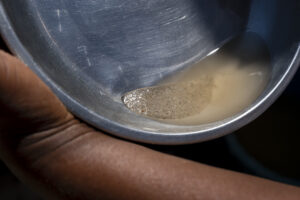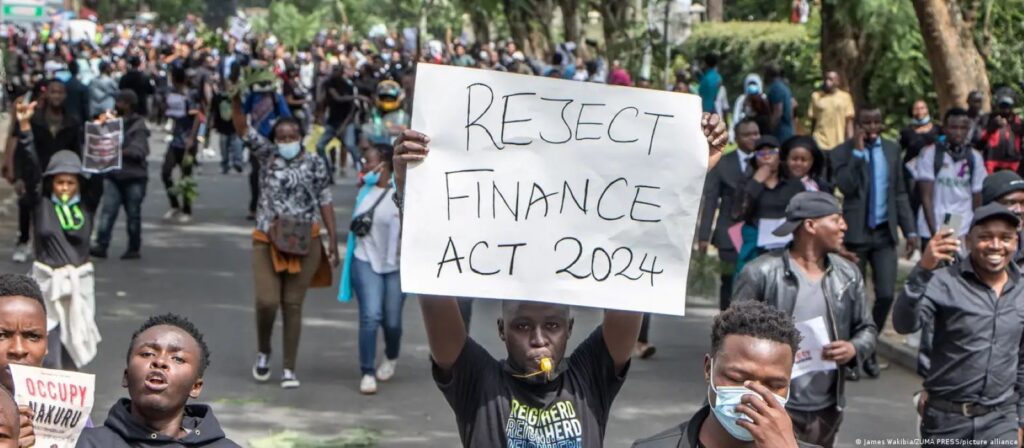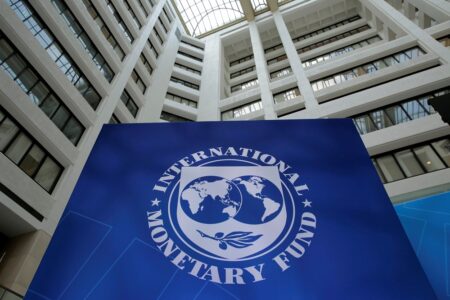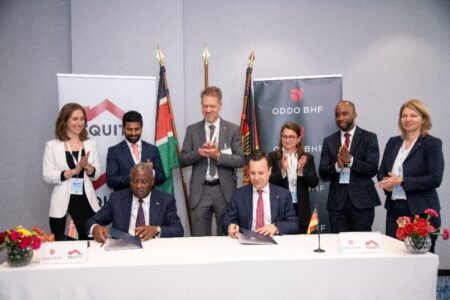- Africa posts sharp decline in support for democracy despite 66 Per cent of the continent preferring democracy over any other system.
- Opposition to military rule has also weakened by 11 points, notably in Mali and Burkina Faso.
- Satisfaction with democracy has notably decreased in prominent democracies like Botswana (-40 points), Mauritius (-40 points), and South Africa (-35 points).
Over the past decade, popular support for democracy has declined sharply in several African countries, and opposition to military rule has weakened a new survey by Afrobarometer has shown.
Afrobarometer’s inaugural flagship report shows that satisfaction with the way democracy works has continued to decline despite that Africans remaining strongly committed to democracy, its norms, and institutions.
The survey covering the period between 2021 and 2023, covers 39 countries, providing data on African experiences and evaluations of democracy, governance, and quality of life.
The findings, based on 53,444 face-to-face interviews, show that most Africans prefer democracy to any other system of government and reject non-democratic alternatives, including military rule.
The findings show that support for democracy remains strong across the 39 surveyed countries, with 66 Per cent of Africans preferring democracy over any other system.
Read Also: Chicken and chips put a taste for democracy to the test
Africa Posts Sharp Decline in Support for Democracy
A whopping 80 per cent reject one-man rule, while 78 per cent are opposed to one-party rule, and 66 per cent against military rule.
However, in 30 countries consistently surveyed over the past decade, support for democracy has declined by 7 percentage points, including significant drops in South Africa (29 points) and Mali (23 points).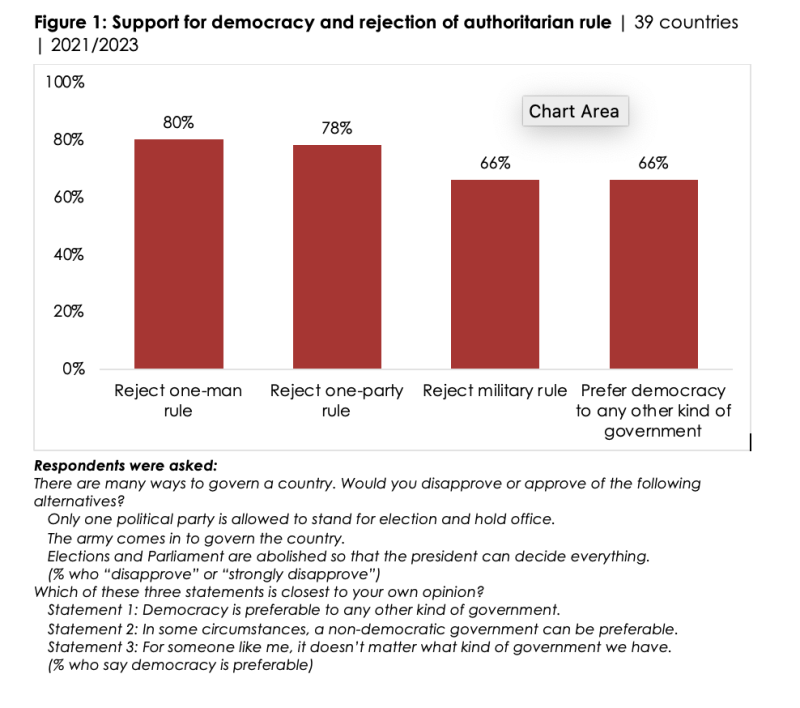
Opposition to military rule has also weakened by 11 points, notably in Mali and Burkina Faso, where it dropped by 40 and 37 points, respectively. Over half of Africans (53 per cent) are willing to accept a military takeover if elected leaders abuse power.
Despite these declines, majorities continue to advocate for government accountability, the rule of law, and other democratic norms such as presidential accountability to Parliament, multiparty competition, presidential term limits, and media freedom.
“Support for elections has decreased by 8 percentage points across 30 countries, although the majority still consider elections the best method for choosing leaders,” the report says in part.
While popular satisfaction with democracy is highly susceptible to economic, social, and political performance, support for democracy is resilient against economic factors such as poverty and poor economic management.
Instead, the evidence points to political factors, including rising corruption in local government, poor-quality elections, and a lack of presidential accountability, as factors that tend to undermine popular faith in democracy.
The survey notes that nurturing support for democracy will therefore require strengthening integrity in local government and improved official accountability.
It also strongly endorses norms, organisations, and practices associated with democratic governance, such as electing political leaders through the ballot box, constitutional limits on presidential tenure, presidential compliance with court rulings, parliamentary oversight of the executive, media freedom, and multiparty competition.
Remarkably for a continent with huge gaps in government services, a clear – and growing – majority say it is more important for a government to be accountable to the people than to “get things done.” But other trends portend danger for the continent’s democratic development.
Opposition to military rule has weakened with more than half of Africans expressing a willingness to tolerate military intervention “when elected leaders abuse power for their own ends,” even though two-thirds reject institutionalised military rule.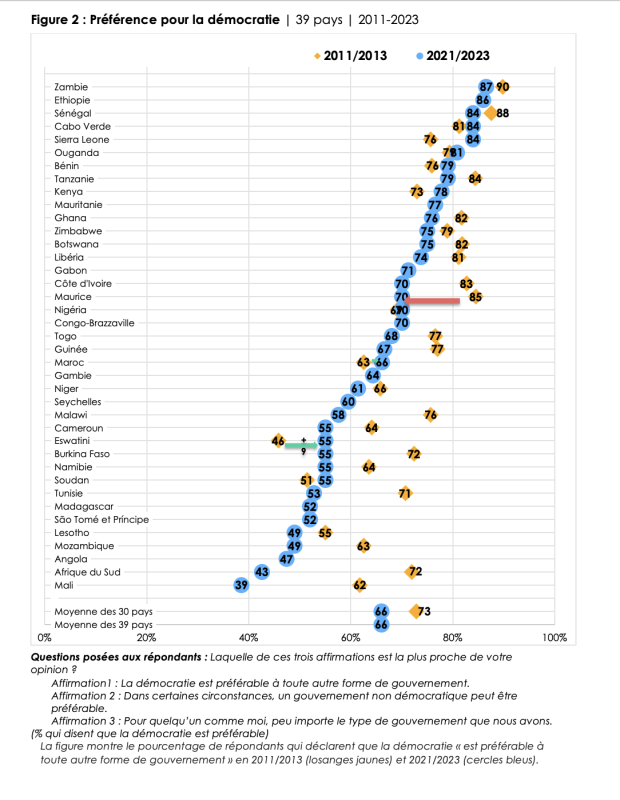
While Africa’s youth differ little from their elders in their support for democracy, they express a greater willingness to permit military intervention.
““Worryingly, perceptions of important democratic governance practices have either been declining over time, as in the case of presidential respect for the judiciary and legislature or have remained dormant at very low levels, as in the case of equal treatment before the law,” read the Survey.
The report also includes country democracy scorecards that present graphic illustrations of Afrobarometer findings on the most critical indicators of democratic demand and supply for each of the countries surveyed.
Read Also: Will 2023 be a Win for Africa’s Democracy?
Supply of Democracy
Fewer than half (45 per cent) of respondents in the 39 countries surveyed believe their countries are mostly or completely democratic, and only 37 per cent are satisfied with how democracy works in their nations.
In 30 countries, these indicators have declined by 8 and 11 percentage points, respectively, over the past decade. Other indicators, such as the quality of elections (-7 points), presidential accountability to Parliament (-7 points), and the courts (-6 points), have also seen modest declines.
Satisfaction with democracy has notably decreased in prominent democracies like Botswana (-40 points), Mauritius (-40 points), and South Africa (-35 points).
Drivers of Democratic Attitudes
Support for democracy as a system remains resilient despite economic and social challenges. Declines in support for democracy are closely linked to adverse changes in political performance, such as declining election quality, increasing corruption, and failure to uphold the rule of law.
Growing citizen dissatisfaction with democracy is strongly associated with perceived declines in both socioeconomic and political performance.


